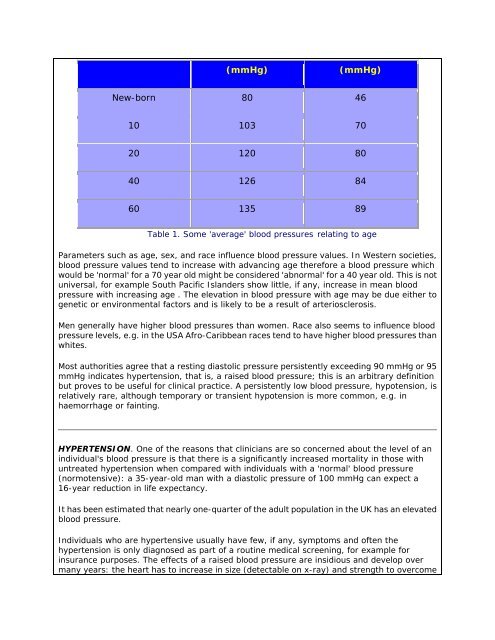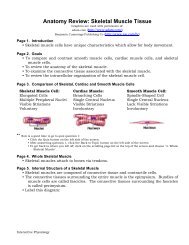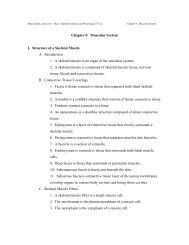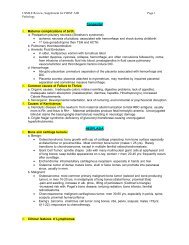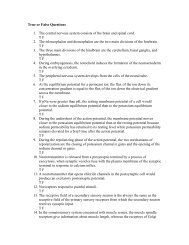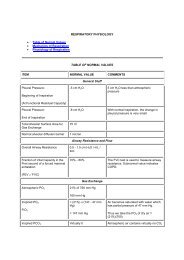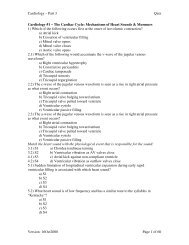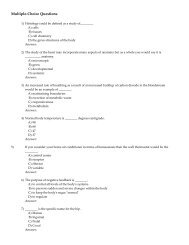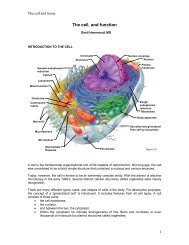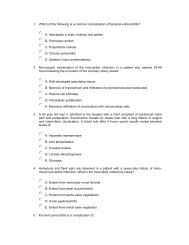(mmHg)(mmHg)New-born 80 4610 103 7020 120 8040 126 8460 135 89Table 1. Some 'average' blood pressures relating to ageParameters such as age, sex, and race influence blood pressure values. In Western societies,blood pressure values tend to increase with advancing age therefore a blood pressure whichwould be 'normal' for a 70 year old might be considered 'abnormal' for a 40 year old. This is notuniversal, for example South Pacific Islanders show little, if any, increase in mean bloodpressure with increasing age . The elevation in blood pressure with age may be due either togenetic or environmental factors and is likely to be a result of arteriosclerosis.Men generally have higher blood pressures than women. Race also seems to influence bloodpressure levels, e.g. in the USA Afro-Caribbean races tend to have higher blood pressures thanwhites.Most authorities agree that a resting diastolic pressure persistently exceeding 90 mmHg or 95mmHg indicates hypertension, that is, a raised blood pressure; this is an arbitrary definitionbut proves to be useful for clinical practice. A persistently low blood pressure, hypotension, isrelatively rare, although temporary or transient hypotension is more common, e.g. inhaemorrhage or fainting.HYPERTENSION. One of the reasons that clinicians are so concerned about the level of anindividual's blood pressure is that there is a significantly increased mortality in those withuntreated hypertension when compared with individuals with a 'normal' blood pressure(normotensive): a 35-year-old man with a diastolic pressure of 100 mmHg can expect a16-year reduction in life expectancy.It has been estimated that nearly one-quarter of the adult population in the UK has an elevatedblood pressure.Individuals who are hypertensive usually have few, if any, symptoms and often thehypertension is only diagnosed as part of a routine <strong>medical</strong> screening, for example forinsurance purposes. The effects of a raised blood pressure are insidious and develop overmany years: the heart has to increase in size (detectable on x-ray) and strength to overcome
the increased resistance caused by the increased blood pressure.The arteries respond to the increased pressure by hypertrophy of the smooth muscle in theirwalls, so that they are able to withstand exposure to the higher pressures.Atherosclerosis formation is also potentiated. The blood vessels most commonly affected arethe cerebral, coronary and renal vessels; cerebrovascular accidents (strokes) and myocardialinfarctions are the commonest clinical manifestations, followed by renal disease.There has been much research and discussion into the causes of hypertension. In a fewinstances, hypertension is secondary to renal or endocrine disease, but in the majority of casesthe cause of primary or essential hypertension is not fully understood.The aetiology of essential hypertension is almost certainly multifactorial and it is likely to proveto be a combination of genetic and environmental factors. Mechanisms that seem to beinvolved include some that affect the extracellular fluid volume and expand the circulatingblood volume, e.g. excessive renin secretion and angiotensin production, increasedsympathetic activity and excessive dietary salt intake, possibly associated with a lowpotassium intake.Some of the treatments prescribed for hypertension relate to these mechanisms, i.e. diuretics(e.g. a thiazide) to increase sodium and water loss; methyldopa, B-adrenoreceptor blockingdrugs (e.g. propranolol), and relaxation techniques to reduce sympathetic activity; restrictionof salt intake. One drug, captopril, inhibits angiotensin converting enzyme in the lungs andreduces the production of angiotensin II.Raised peripheral resistance is linked with hypertension and so drugs that producevasodilation are useful.There are many risk factors associated with the development of hypertension, includingobesity, high alcohol and salt intakes and some drugs (e.g. oral contraceptives,corticosteroids, monoamine oxidase inhibitors). There is also often a positive family history ofhypertension: if both parents are hypertensive, there is a significantly greater risk that theirchildren will also develop high blood pressure.If hypertension is diagnosed and effectively treated, usually by drug therapy, much of thecardiovascular-related disease can be prevented.Measurement of arterial blood pressure. The first documented measurement of bloodpressure dates back to the eighteenth century. In 1773, Stephen Hales, an English theologianand scientist, directly measured mean blood pressure in an unanaesthetized horse by insertingan open-ended tube directly into the animal's neck.The blood entered the tube and rose upwards (to a height of 2.5 m) towards the tube openinguntil the weight of the column of blood was equal to the pressure in the circulatory system ofthe horse. This is the basis of a simple pressure manometer which is still used for measuringblood pressure. It is the basis too for measuring cerebrospinal fluid pressures during a lumbarpuncture.


